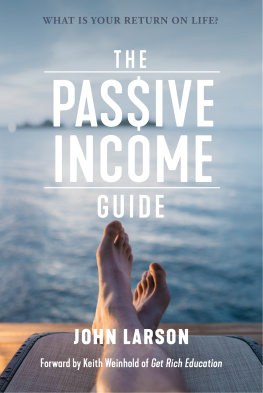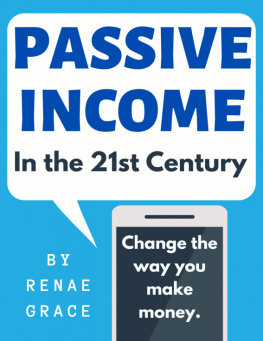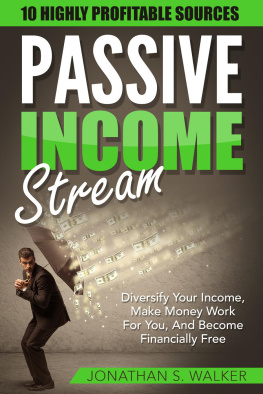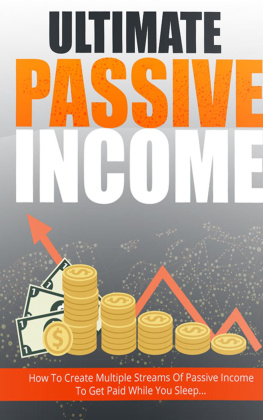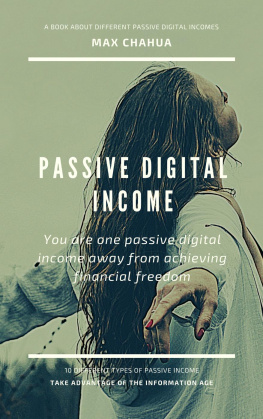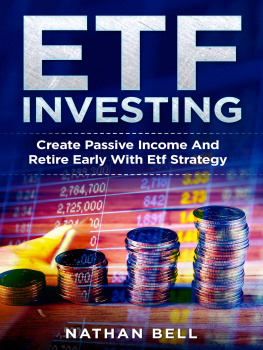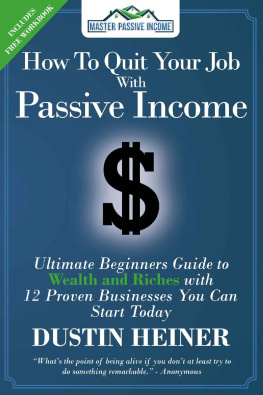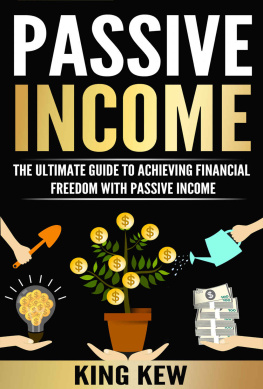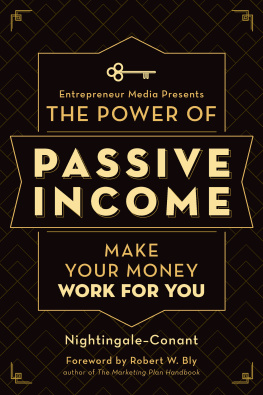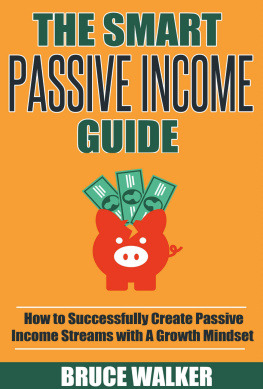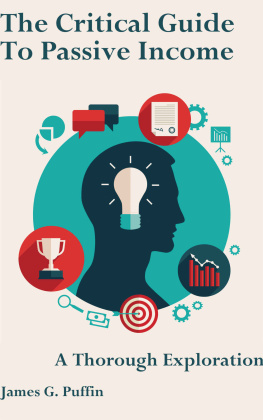Samuel Garcia - Passive Income Strategy In A Week
Here you can read online Samuel Garcia - Passive Income Strategy In A Week full text of the book (entire story) in english for free. Download pdf and epub, get meaning, cover and reviews about this ebook. year: 2020, genre: Business / Computer. Description of the work, (preface) as well as reviews are available. Best literature library LitArk.com created for fans of good reading and offers a wide selection of genres:
Romance novel
Science fiction
Adventure
Detective
Science
History
Home and family
Prose
Art
Politics
Computer
Non-fiction
Religion
Business
Children
Humor
Choose a favorite category and find really read worthwhile books. Enjoy immersion in the world of imagination, feel the emotions of the characters or learn something new for yourself, make an fascinating discovery.

- Book:Passive Income Strategy In A Week
- Author:
- Genre:
- Year:2020
- Rating:4 / 5
- Favourites:Add to favourites
- Your mark:
- 80
- 1
- 2
- 3
- 4
- 5
Passive Income Strategy In A Week: summary, description and annotation
We offer to read an annotation, description, summary or preface (depends on what the author of the book "Passive Income Strategy In A Week" wrote himself). If you haven't found the necessary information about the book — write in the comments, we will try to find it.
Passive Income Strategy In A Week — read online for free the complete book (whole text) full work
Below is the text of the book, divided by pages. System saving the place of the last page read, allows you to conveniently read the book "Passive Income Strategy In A Week" online for free, without having to search again every time where you left off. Put a bookmark, and you can go to the page where you finished reading at any time.
Font size:
Interval:
Bookmark:

Passive Income Strategy In A Week
By Samuel Garcia
Copyright 2020, Samuel Garcia. All rights reserved.
I make no guarantee that you will be able to make any amount of money with this method. It has a degree of learning, applying, taking action, sticking to it, and even getting lucky.
I am not a tax or financial or legal professional. This book is not tax, financial, or legal advice.
I may make a profit with the partnerships and affiliation in this book. The partnerships and affiliation are there to help you learn deeper in detail the things mentioned in the book. However, they are not at all necessary, and you can do research yourself to fill the knowledge gap using Google and YouTube.
Passive income often does not mean you will get rich. It does mean once you understand how and apply it, it will snowball over a period of time, and you can start having extra money or be paying off some bills here and there.
Taxes are far more complicated once you get past $600. You will also have to set aside at least 15% per month for it. You can use deductions to mitigate that, but it is still a pain.
It usually takes a long time to gain any traction unless you put more hours or money into it.
There is a ton of work in the beginning. Passive income does not mean no work, it means a lot of work at the start, and then keeping up a lot less.
Working smarter is often more prized than working harder. In a job, you can probably just work harder in the things you already know. This will demand learning as you go.
Are you dissuaded yet? If so, you still need to do the first step. Everyone needs to do the first step, Day 1, as it is the easiest way to start with little maintenance involved.
There is always a starting capital: time or money. And behind those two is energy management.
All of these things need computer and internet access. Some may need a smartphone.
Sign up for a Google account and an Amazon account. They will be used for a lot of things.
You will also need a PayPal account, bank account, and social security for some of the forms that need to be filled out so you can get your money.
Note that this process of actually accumulating may take a year or even more. There is always a long drawn out process before it ramps up. What makes it faster is often spending more time and even money on it. But if youre not going to be spending money, you will need to be spending a lot more time.
There are many set and forget things I include, but some need maintenance.
There is a line between passive income and working from home/working remotely. No passive income is purely passive. There is always a management element involved.
The hardest part is to get started. The trick is being consistent. Google everything you know.
You will need at least an hour per day to do all the things. Some days will take up to three hours or more.
Basics:
Computer and/or smartphone
Internet access (If you are starting from zero, look for a public library with computer access)
To Get Paid:
Personal Information as you will be filling out a lot of forms
Mailing Address (for checks)
PayPal account
Social Security (in US) or other Tax ID information
Bank accounts Information
Necessary Accounts:
Google/Gmail account ( http://google.com )
Amazon account ( http://amazon.com )
Facebook account ( http://facebook.com )
The primary goal is to accumulate assets .
This basic idea is from Rich Dad, Poor Dad . To put simply, everything you have is either an asset or liability .
- Assets = Things that make you money. Stocks, businesses, other investments.
- Liabilities = Things that take money from you. Mortgages, debt, loans, taxes.
You can turn liabilities to assets. Some liabilities are assets only when you sell and make a profit.
For example, a house costs you taxes, repairs, and so on. It is a liability.
If the house lets you deduct it from taxes due to a home business, it is still a liability, but a better liability than not using it.
When the house is sold and profits because appreciation, it is an asset.
When it is used as a rental house, and the revenue is over the expenses, it is an asset.
However, if the rental house loses money, it is a liability, until it is sold for profit.
A car you use takes money from you by depreciation, gasoline, wear and tear, repairs, and maintenance. It is a liability.
If you use said car as an Uber driving, or allows you to do business, and you profit from those, it is barely an asset.
The average millionaire has seven income streams, or seven assets or groups of assets.
The high level strategy of this is monetizing every action you make. You make each action as an asset or lessening the impact of a liability.
This is not a one trick pony. You can add or remove things as you see fit, but the point is, monetizing everything you do.
To build on top of that, each action you will take can also be classified as :
- Create = making material of value that serves as assets
- Repurpose = turning assets and liabilities into more assets
- Optimize = improving assets ability to help people and thus increasing the assets value
- Promote = lending and giving your assets to people who need them, and in turn, they will give you money
- Invest = acquiring and putting more into assets
Always, always be creating something. Create something every day. Even long Facebook posts. Long Facebook posts means you are passionate about something and you can copy and paste it.
We will also be looking at these different asset classes:
- Investment Assets: Stuff you put in money that will give you money back usually in the form of interest
- Physical Assets: Repurposed stuff you can hold with your hands you can rent out or sell to make money
- Written Information Assets: Writing that will make you money
- Multimedia Information Assets: Videos and like things that will make you money
- E-Commerce Assets: Online store or services type assets that make money if someone buys from it
- Creative/Intellectual Assets : Music, art, characters, patents, and other things you can license. Just assets people dont usually think about that also fall into the previous categories.
Last but not least,
- Personal Assets: Your body, your energy, your mind, your knowledge, your time, and so on are probably the most important assets of all.
What is a pyramid scheme?
Usually, it means that investors in the scheme are promised profits, but said profits come from new investors, and those new investors are promised profits, so new investors have to be recruited.
Now, not all MLM things are full pyramid schemes. Many have actual products to sell. But usually, the recruits do most of the work for little anything, and only if they recruit others themselves will they actually start earning money.
If the main push of a business is for you to become the team leader of saleswomen and that team leader is earning money while the grunts are losing money, its probably an abusive scheme.
A good business will not need recruits to make money. Its products are highly marked up and in demand enough not to need recruits.
Next pageFont size:
Interval:
Bookmark:
Similar books «Passive Income Strategy In A Week»
Look at similar books to Passive Income Strategy In A Week. We have selected literature similar in name and meaning in the hope of providing readers with more options to find new, interesting, not yet read works.
Discussion, reviews of the book Passive Income Strategy In A Week and just readers' own opinions. Leave your comments, write what you think about the work, its meaning or the main characters. Specify what exactly you liked and what you didn't like, and why you think so.

